- Seite 1 und 2: Vorabdruck für die Bundespressekon
- Seite 3 und 4: 4.2 Lastmanagement.................
- Seite 5 und 6: Glossar ...........................
- Seite 7 und 8: Kurzzusammenfassung schutz mit eine
- Seite 9: Executive Summary „100% renewable
- Seite 13 und 14: Einleitung da sie nach aktuellen Be
- Seite 15 und 16: Einleitung Klimawandel auf uns und
- Seite 17 und 18: Einleitung verwenden. Dazu gehören
- Seite 19 und 20: Demografische und wirtschaftliche R
- Seite 21 und 22: Energieverbrauch im Jahr 2050 3 Ene
- Seite 23 und 24: Energieverbrauch im Jahr 2050 Haush
- Seite 25 und 26: Energieverbrauch im Jahr 2050 Tabel
- Seite 27 und 28: Energieverbrauch im Jahr 2050 mögl
- Seite 29 und 30: Energieverbrauch im Jahr 2050 3.2.2
- Seite 31 und 32: Energieverbrauch im Jahr 2050 3.2.4
- Seite 33 und 34: Energieverbrauch im Jahr 2050 folge
- Seite 35 und 36: Energieverbrauch im Jahr 2050 Der E
- Seite 37 und 38: Energieverbrauch im Jahr 2050 10 TW
- Seite 39 und 40: Energieverbrauch im Jahr 2050 sich
- Seite 41 und 42: Potentiale von Stromspeichern und L
- Seite 43 und 44: Potentiale von Stromspeichern und L
- Seite 45 und 46: Potentiale von Stromspeichern und L
- Seite 47 und 48: Potentiale von Stromspeichern und L
- Seite 49 und 50: Potentiale von Stromspeichern und L
- Seite 51 und 52: Potentiale von Stromspeichern und L
- Seite 53 und 54: Potentiale von Stromspeichern und L
- Seite 55 und 56: Potentiale von Stromspeichern und L
- Seite 57 und 58: Potentiale von Stromspeichern und L
- Seite 59 und 60: Potentiale von Stromspeichern und L
- Seite 61 und 62:
Potentiale der erneuerbaren Energie
- Seite 63 und 64:
Potentiale der erneuerbaren Energie
- Seite 65 und 66:
Potentiale der erneuerbaren Energie
- Seite 67 und 68:
Potentiale der erneuerbaren Energie
- Seite 69 und 70:
Potentiale der erneuerbaren Energie
- Seite 71 und 72:
Potentiale der erneuerbaren Energie
- Seite 73 und 74:
Potentiale der erneuerbaren Energie
- Seite 75 und 76:
Potentiale der erneuerbaren Energie
- Seite 77 und 78:
Potentiale der erneuerbaren Energie
- Seite 79 und 80:
Potentiale der erneuerbaren Energie
- Seite 81 und 82:
Das Szenario „Regionenverbund“
- Seite 83 und 84:
Das Szenario „Regionenverbund“
- Seite 85 und 86:
Das Szenario „Regionenverbund“
- Seite 87 und 88:
Simulation des Szenarios „Regione
- Seite 89 und 90:
Simulation des Szenarios „Regione
- Seite 91 und 92:
Simulation des Szenarios „Regione
- Seite 93 und 94:
Simulation des Szenarios „Regione
- Seite 95 und 96:
Simulation des Szenarios „Regione
- Seite 97 und 98:
Simulation des Szenarios „Regione
- Seite 99 und 100:
Simulation des Szenarios „Regione
- Seite 101 und 102:
Simulation des Szenarios „Regione
- Seite 103 und 104:
Simulation des Szenarios „Regione
- Seite 105 und 106:
Simulation des Szenarios „Regione
- Seite 107 und 108:
Simulation des Szenarios „Regione
- Seite 109 und 110:
Simulation des Szenarios „Regione
- Seite 111 und 112:
Simulation des Szenarios „Regione
- Seite 113 und 114:
Simulation des Szenarios „Regione
- Seite 115 und 116:
Simulation des Szenarios „Regione
- Seite 117 und 118:
Simulation des Szenarios „Regione
- Seite 119 und 120:
Simulation des Szenarios „Regione
- Seite 121 und 122:
Simulation des Szenarios „Regione
- Seite 123 und 124:
Simulation des Szenarios „Regione
- Seite 125 und 126:
Simulation des Szenarios „Regione
- Seite 127 und 128:
Simulation des Szenarios „Regione
- Seite 129 und 130:
Simulation des Szenarios „Regione
- Seite 131 und 132:
Simulation des Szenarios „Regione
- Seite 133 und 134:
Simulation des Szenarios „Regione
- Seite 135 und 136:
Simulation des Szenarios „Regione
- Seite 137 und 138:
Simulation des Szenarios „Regione
- Seite 139 und 140:
Simulation des Szenarios „Regione
- Seite 141 und 142:
Simulation des Szenarios „Regione
- Seite 143 und 144:
Simulation des Szenarios „Regione
- Seite 145 und 146:
Simulation des Szenarios „Regione
- Seite 147 und 148:
Simulation des Szenarios „Regione
- Seite 149 und 150:
Simulation des Szenarios „Regione
- Seite 151 und 152:
Simulation des Szenarios „Regione
- Seite 153 und 154:
Simulation des Szenarios „Regione
- Seite 155 und 156:
Simulation des Szenarios „Regione
- Seite 157 und 158:
Simulation des Szenarios „Regione
- Seite 159 und 160:
Simulation des Szenarios „Regione
- Seite 161 und 162:
Simulation des Szenarios „Regione
- Seite 163 und 164:
Simulation des Szenarios „Regione
- Seite 165 und 166:
Handlungsempfehlungen 8 Handlungsem
- Seite 167 und 168:
Handlungsempfehlungen transparenten
- Seite 169 und 170:
Handlungsempfehlungen Produkte. Bes
- Seite 171 und 172:
Handlungsempfehlungen und Verkehrsp
- Seite 173 und 174:
Handlungsempfehlungen Emissionshand
- Seite 175 und 176:
Handlungsempfehlungen Brennstoffkos
- Seite 177 und 178:
Handlungsempfehlungen der Umweltent
- Seite 179 und 180:
Handlungsempfehlungen Projekt Offsh
- Seite 181 und 182:
Handlungsempfehlungen konventionell
- Seite 183 und 184:
Handlungsempfehlungen Keine Laufzei
- Seite 185 und 186:
Handlungsempfehlungen 8.9 Akzeptanz
- Seite 187 und 188:
Zusammenfassung 9 Zusammenfassung D
- Seite 189 und 190:
Zusammenfassung Deutschlands und Eu
- Seite 191 und 192:
Zusammenfassung führt werden. Ein
- Seite 193 und 194:
Abbildungsverzeichnis Abbildungsver
- Seite 195 und 196:
Abbildungsverzeichnis Abbildung 7-1
- Seite 197 und 198:
Tabellenverzeichnis Tabellenverzeic
- Seite 199 und 200:
Literaturverzeichnis Literaturverze
- Seite 201 und 202:
Literaturverzeichnis tionale Entwic
- Seite 203 und 204:
Literaturverzeichnis DEENET 2009 de
- Seite 205 und 206:
Literaturverzeichnis Donadei 2010 D
- Seite 207 und 208:
Literaturverzeichnis mal Power Gene
- Seite 209 und 210:
Literaturverzeichnis (Hrsg.), Niede
- Seite 211 und 212:
Literaturverzeichnis Bonow, M. (Hrs
- Seite 213 und 214:
Literaturverzeichnis Stern, N. (200
- Seite 215 und 216:
Literaturverzeichnis UBA 2010a Dusc
- Seite 217 und 218:
2050: Vom Ziel her denken. Studie i
- Seite 219 und 220:
Abkürzungsverzeichnis FVS Forschun
- Seite 221 und 222:
Glossar Glossar Adiabates Druckluft
- Seite 223 und 224:
Glossar Primärregelleistung siehe
- Seite 225 und 226:
Anhang Leistung (GW) Leistung (GW)
- Seite 227 und 228:
Anhang Leistung (GW) Leistung (GW)
- Seite 229 und 230:
Anhang Leistung (GW) Leistung (GW)
- Seite 231 und 232:
Anhang Leistung (GW) 70 60 50 40 30
- Seite 233 und 234:
Anhang Residuallast (GW) Residualla
- Seite 235 und 236:
Anhang Residuallast (GW) Residualla
- Seite 237 und 238:
Anhang Leistung (GW) Leistung (GW)






